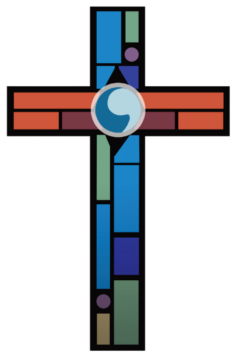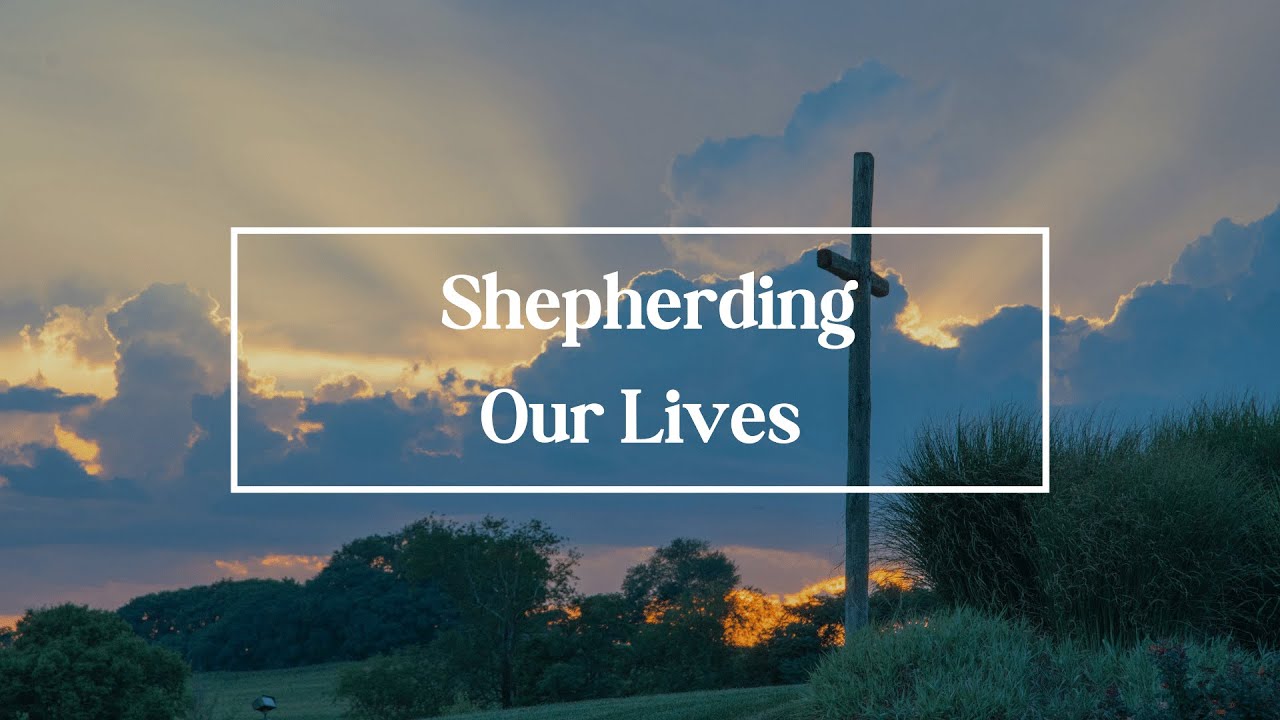This image of Jesus as the good Shepherd is one that I think we really love.
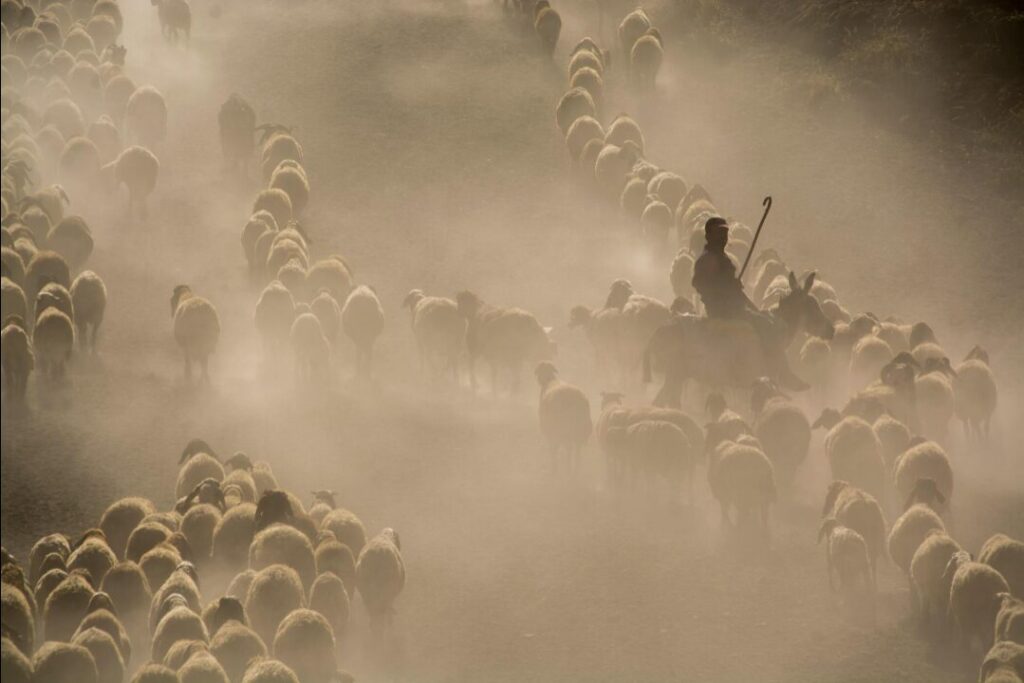
I think it’s one of those beloved things. So I did choose a shepherd image that is not maybe as comforting as some. I know in the church up the road at Salem, UCC of Roherstown, they have a Good Shepherd window that is the normal Good Shepherd image with Christ carrying a lamb across his shoulders. My grandparents always sat so that it was directly in front of them. So, that’s where I sat too. That image is comforting to me because we always think that we’re the one sheep that Jesus would leave the 99 to rescue. But maybe that’s not really who we are. Maybe we’re one of the 99 that get left out.
I think there’s a lot that comes into this idea of Jesus as shepherd.
If Jesus is our shepherd, then Jesus is the one who is to be guiding our lives. The one that we look to for answers. The one we listen to, more than our own desires.
That’s where the rub is, isn’t it? Because we want to be independent people. We want to do life our way. That’s the American way, but that’s not the Christian way. The Christian way says we follow Jesus. He’s our guide, He’s our model, and He’s the one directing where we go and what we do.
There’s a couple other points that he makes in this passage and I think we have a tendency to get caught in sort of this nostalgic feel good “We’re special because Jesus would do anything including lay down his life for us.” That’s true and it’s also true that we probably are more in the 99 and we need to think about that one that Jesus will go off to rescue.
Because that one is going to be one of the vulnerable in our society. One of the ones who is shunned or pushed to the edges, marginalized is a word we use a lot today. One who doesn’t have a voice in the public square. One who is discriminated against. So I just want you to stop and think. This is a question for you to contemplate.
Who is that today? Who, who are the vulnerable in our society today? Who are the ones without voice?
Because that’s who Jesus wants to take care of. That’s who Jesus wants us to take care of.
Then we have this other piece, John 10:16 says, “I have other sheep that do not belong to this fold. I must bring them also, and they will listen to my voice.” There will be one flock, one shepherd. What I hear in that is this idea that they’re all welcome to the table. In fact, if there’s not room at the table, then we need to make the table bigger.
But we’ve spent millennia, Big Church has spent millennia deciding who’s really worthy and who’s not. Who’s welcome and who’s not. But that’s not what this says. This is Jesus inviting everybody, looking at us to say, how are you living that out?
I hear that in our Inclusive Refuge and in our Compassionate Justice. But it matters how we’re living. That’s something for us to think about.
Then we have Psalm 23. “The Lord is my shepherd; I shall not want. He makes me lie down in green pastures; he leads me beside still waters; he restores my soul. He leads me in right paths for his name’s sake. Even though I walk through the darkest valley, I fear no evil, for you are with me; your rod and your staff, they comfort me. You prepare a table before me in the presence of my enemies; you anoint my head with oil; my cup overflows. Surely goodness and mercy shall follow me all the days of my life, and I shall dwell in the house of the Lord my whole life long.”
I don’t know about you, but this was the first piece of scripture that I memorized. I had the whole thing memorized because when I was a young teenager my mother taught me to be afraid of strangers, particularly the people in our town. Our town wasn’t a safe place to be. It wasn’t a big town. She had me walk to piano lessons for a mile and a half every week by myself. It was a different world. People don’t have kids walk a mile and a half by themselves anymore. Maybe in the city to get to school. But at that time she set up that situation so I would repeat the 23rd Psalm all the way to piano lessons and back because I felt like that kept me safe. It worked for me. Nobody bothered me. They might have thought I was crazy, “Hey, there’s that kid again mumbling to herself.” But they left me alone.
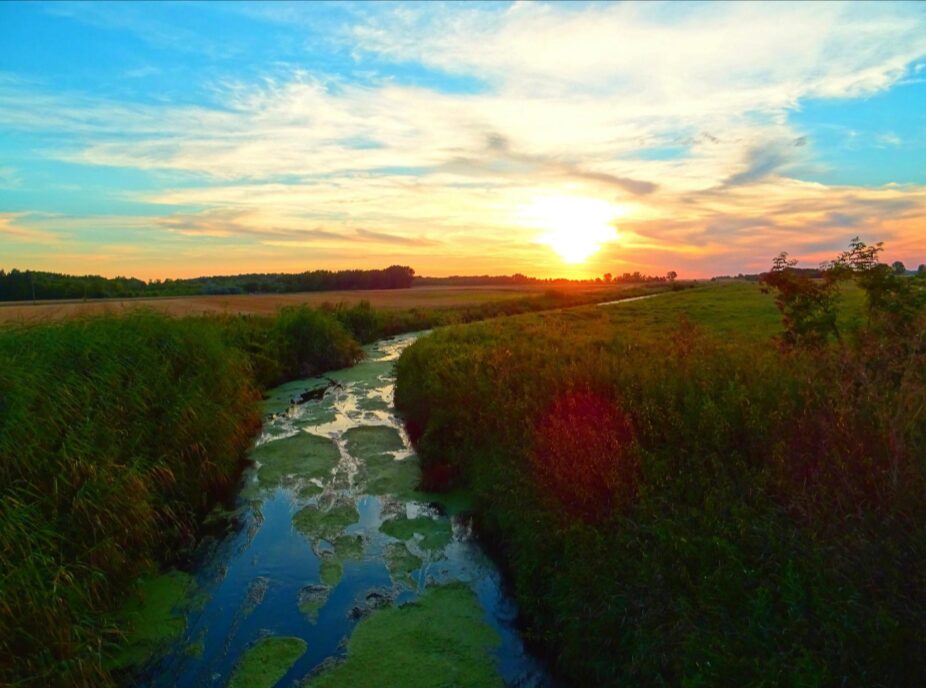
That scripture evokes a sense of comfort within us. But if you read it seriously, there’s hard stuff in that scripture. We love that we’re invited to lay down in green pastures and walk beside still waters. We love that. We love that our cups will runneth over.
But there’s also that whole piece about walking through the valley of the shadow of death and making a place for me at the table of my enemies.
I saw a post this week by our associate conference minister who suggested that this is a psalm that you could take and meditate on every day because every day there’s a piece of it that would work for you. And I would encourage you to do that.
It is about comfort. It is about reminding us that God is with us through everything, through the highs and the lows. Through the good and the bad, the gratitude and the fear.
But then I wonder, do we think about God being with us all the time? Do we think about that? Do we think about God seeing the choices that we make? Monday through Saturday? Or just when we walk in the Sanctuary?
Would you make different choices if you thought about the fact that God was watching you all the time?
I think God is watching us all the time and nudging us, like the shepherd, prodding us in the right direction. Sometimes we go, and sometimes we say, “Nah, not today. I don’t feel like it today. I’d rather binge watch Netflix today. Because that’s all I can manage.” That’s not the end of the world. We’re still forgiven. But it’s not all easy. Right?
A Place at the Table
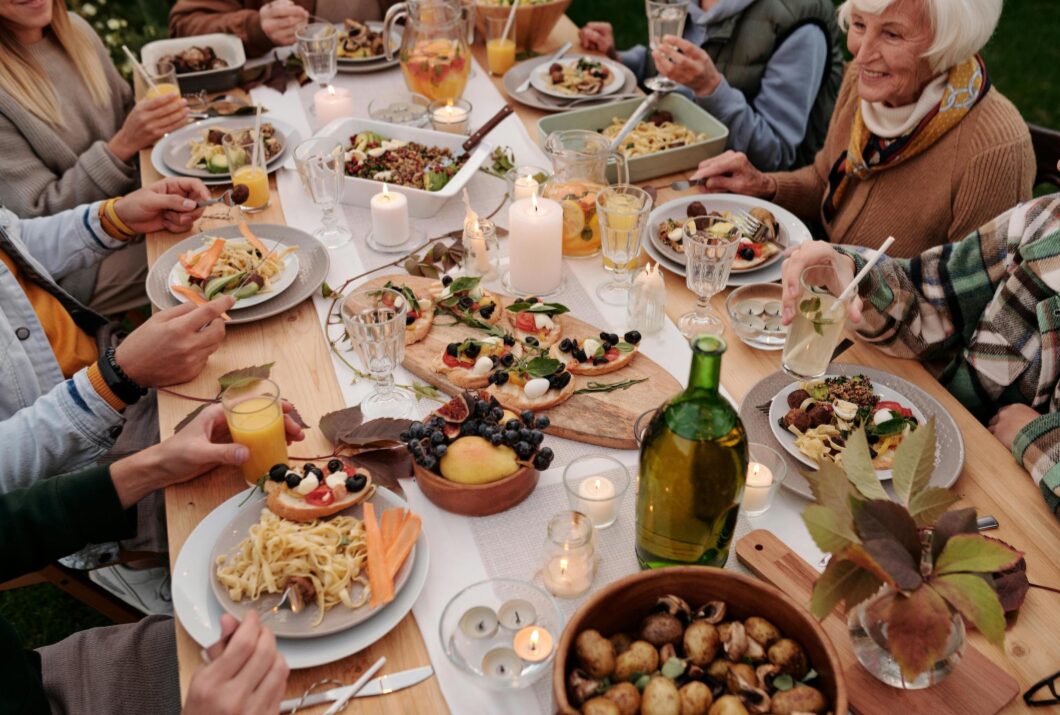
That’s the theme for today. With this picture, I think any of us would take a place at that table. That looks like they’ve got a wonderful assortment of food. There’s plenty of food, plenty of good fellowship.
But what if it is a table with people that you would consider enemies? This isn’t about us just sitting down with our families on Thanksgiving. This is about us, the Catholics, and the Protestants of Ireland sitting down at a table together back in the 90s. This is about Israelis and Palestinians sitting down at a table now and not talking about all the pain, but just talking more deeply so that they hear the hurt in each other. Because everyone’s hurting.
We have to remember the humanity. That’s the beauty of the table, I think. Is that when we sit down at a meal together, then we start talking about more than the weather and the social pleasantries, and we can really hear what’s on one’s heart. If one feels safe enough to share.
We recognize that we all have essentially the same goals. We all want to be loved and we all want to feel like we belong. We all want to feel like we matter in this world. That it matters that we got up today. That we’re above ground, as I’ve heard people say. We all want that.
The Africans have a word called “Ubuntu”. Which means, “I am because you are.” and “You are because I am.” We are interconnected. And we forget that. We forget that we’re interconnected. We forget that we need one another.
So we need to make a bigger table if there’s not enough room. Because everyone deserves a place at the table with everything that they bring to that.
That can be a challenge because there’s some people I would not want to sit down at a table with. And I bet you have a list too. There’s definitely some people I would be like, “Really? Not that one. Anybody but that person, please.” But sometimes God calls us to those places where we have to sit down with that one.
Our United Church of Christ has called in this season for prayers of peace. There’s actually a place on the website where you can submit your own prayer of peace. I’m going to be sharing one written by the Reverend Dr. Nora Faust this week with the conference. She is our associate conference minister about being a peacemaker.
But there is so much war in our world right now. So much conflict. I feel like our country is headed to the brink of that ourselves. In the way we are divided so deeply. We need to find ways to talk to one another. To see one another and to figure out how we move forward together.
There was a news piece this week about speaker Johnson and the commentators thought it was terrible that as a Republican speaker, he was going to have to rely on Democrats to get a bill through. And I thought, Hallelujah! We have to recognize that it can’t be all just my people. Well, all my people are going to vote for it and we’re going to make you do it. Regardless of what you think. We have to come together and find how to compromise. It’s the only way we go forward. We’ve got to get rid of the sharp lines we have. In our country, in our community, they’re here too.
So, I encourage you, if you’re inclined to write, I encourage you to write. If you’re able to get on the internet, put your prayer in there. There’s not a lot of prayers yet, but it’ll get published. It’ll end up on the UCC website. You can tell us about it. We’ll all go on it and see it and celebrate with you. Doesn’t have to be your best work ever, but it matters that we be involved in bringing about peace. I think that’s who Jesus calls us to be. May it be so.
